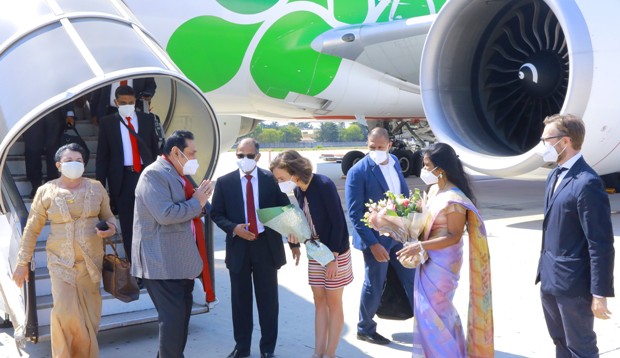PM calls for unity at G20 interfaith dialogue in Italy as expats protest
COLOMBO – Sri Lanka Prime Minister Mahinda Rajapaksa called for reconciliation, unity and solidarity at the G20 Interfaith Dialogue in Bologna, Italy, on Sunday (12), even as Sri Lankan expatriates staged protests and counter-protests centred on the 2019 Easter bombings.
News footage showed a group of Sri Lankans carrying the national flag and placards demanding the Sri Lankan government to expedite the investigation.
One man was heard asking about the identity of an intelligent officer referred to by the code name ‘Sonic’ and is alleged to have had contacts with one of the attackers.
Colombo Archbishop Malcolm Cardinal Ranjith, the head of Sri Lanka’s Catholic church, had claimed on August 13 that the person known as ‘Sonic’ had used one ‘Zaharan of Matale’ to call an unspecified person in Indonesia to “force” ISIS to claim responsibility for the attack.
Another protestor said: “We’re not making accusations against anyone. We have only ever asked for justice.”
Meanwhile, another group of Sri Lankans held their own protest in support of the government.
“This is not fair. It’s a black mark for the country. Problems in the country must be resolved within the country,” one protestor said.
Rajapaksa’s visit to Italy has been controversial at home. Prior to his departure, Cardinal Ranjith suggested the prime minister would be meeting Pope Francis during his visit and brief him on the Easter bombings probe.
The PM’s office issued a clarification a day later claimed he had not sought an audience with the pope, nor had the latter extended an invitation.
Speaking at the G20 event, Rajapaksa said extremist ideology, and violence associated with it, represent one of the most serious challenges of today.
Recalling the events of 9/11, the prime minister said: “This is a reminder of the need for eternal vigilance against all forms of terrorist action, whoever be the offenders and whatever be their professed aims and purposes.”
Rajapaksa appealed for global unity in the face of the COVID-19 crisis and emphasized the importance of vaccine availability for poorer nations. He also suggested that isolation is not the answer.
“Reconciliation is a critical need of our time. Conflicts and escalating tensions are all too evident around us. Peace and stability come from healthy relationships with all who live in our countries, including those with whom we have deep disagreements,” he said.
-economynext.com


